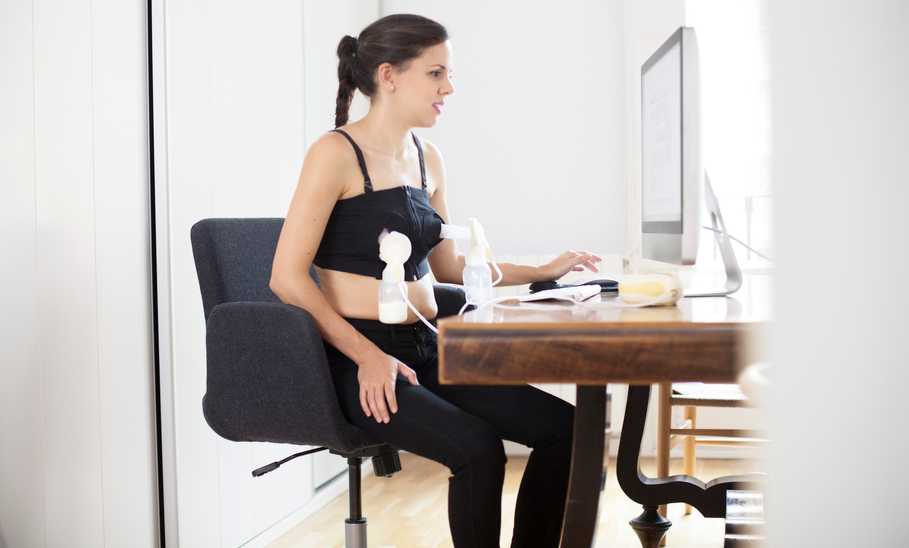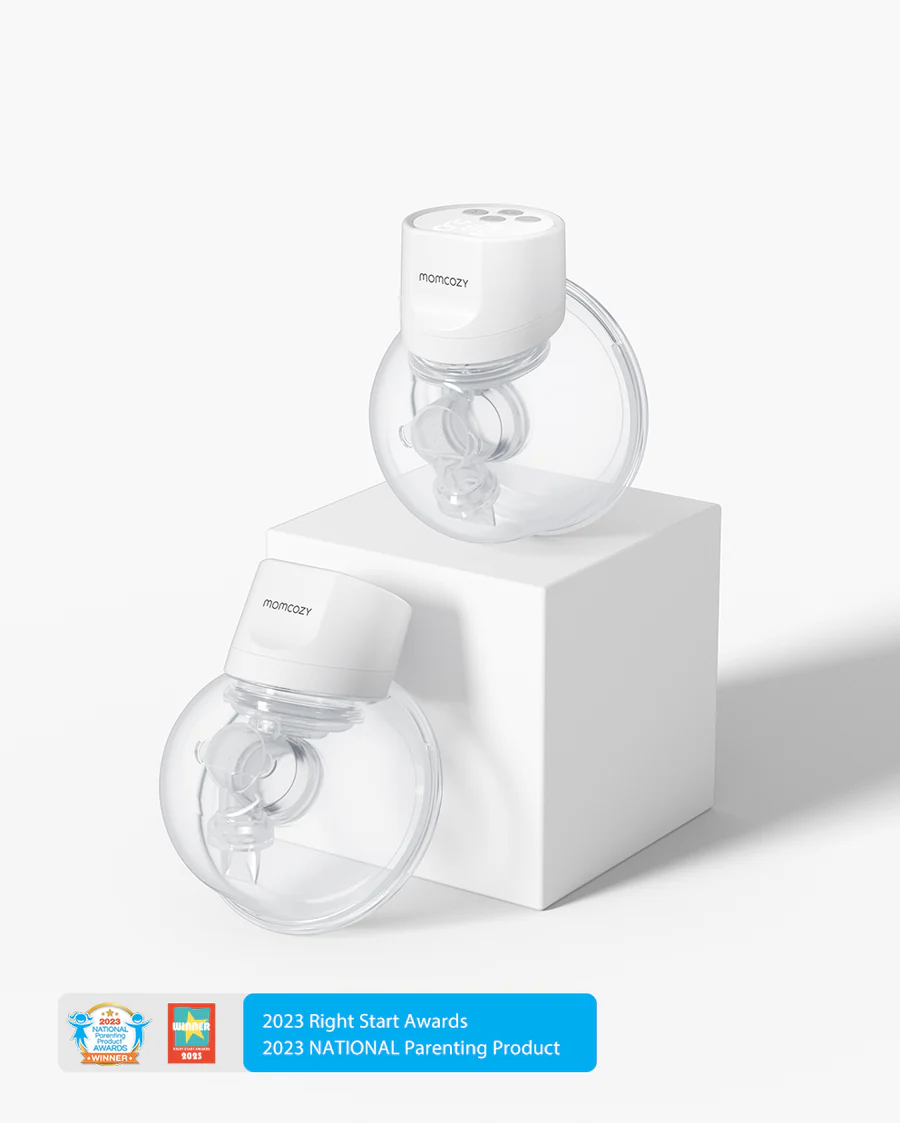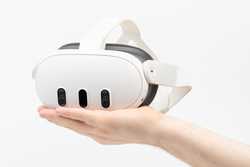- Flange sizes: 24 mm and 28 mm
- Milk capacity: 5 oz per side
- Dimensions: 2.68” x 4.33” x 5.04”
- Weight: 7.9 oz
- Battery life: Approximately 2.5 hours
- App?: Yes
Best Wearable Breast Pumps That Give You the Freedom to Leave Your House

Our evaluations and opinions are not influenced by our advertising relationships, but we may earn a commission from our partners’ links. This content is created by TIME Stamped, under TIME’s direction and produced in accordance with TIME’s editorial guidelines and overseen by TIME’s editorial staff. Learn more about it.
estimated that one year of breastfeeding equates to 1,800 hours—which means it’s a full-time job on top of that whole keeping-a-tiny-human-alive thing. Unless you plan to never leave your baby’s side for more than, say, three hours in their first year of life, you’ll likely spend a bit of time literally tethered to a breast pump. Great for catching up on your Netflix backlog, not so great for actually getting stuff done, like washing baby bibs and cleaning high chairs.
When compiling a list of baby gifts for newborns for your shower, put wearable hands-free breast pumps to the top, above items like travel strollers. A game-changer when they hit the market in the late 2010s, these slip in your bra and you can almost forget about them. These devices are quieter, more discreet and, most importantly, provide nursing parents with much needed freedom—whether that means pumping while traveling, at a concert or just doing chores around the house. In the days since the Elvie and the Willow ruled the space, a slew of new competitors have emerged. While different people tend to respond to different devices, we pumped lactation consultants and nursing parents alike to compile this list of the best wearables on the market today.

An oldie and a goodie, lactation consultant Belen, puts this OG hands-free breast pump at the top of her list. For users, the device checks off a lot of boxes with a lightweight design, a quiet motor that allows for discreet pumping, an intuitive app that allows for easy monitoring of their progress, an auto-detection that shuts off when you’ve hit the five-ounce capacity, and more. It’s even dishwasher-safe and the company is known for its top-notch customer service.
For one mom, it was key to kicking off her nursing journey because while she found her plug-into-the-wall pump uncomfortable to use, the Elvie “was so easy and it didn’t hurt when I had it attached. I could be doing almost anything and put it in and it got a lot of milk.” Though, one caveat, she added, is that when she had to increase milk production to meet her son’s needs, she did mix in more sessions with her wall pump, noting she got more output than with her Elvie.
The OG Elvie edges out the pack thanks to a discreet design and super quiet motor.

The upgraded version of this budget-friendly, hospital-grade pick boasts a double-sealed flange design that promises a tighter fit for a more comfortable and productive pump session. The motors sit on top of the cups, making for a slightly bulkier appearance that likely wouldn’t allow for pumping fully incognito, but reviewers rave about the four-hour battery life and features like the easy pour spout and a completely clear design that lets you keep tabs on your milk. That last bit is particularly key because while the cups can hold up to six ounces, the manufacturer recommends limiting it to four to avoid spillage.
Score a heavyweight pump on a relatively lightweight budget with this hospital-grade choice.

The Freemie’s model has cups that each hold up to 8 ounces of precious liquid gold and the motor has noise-reduction technology to make the pumping process nearly silent. Though the tubing makes it less discreet than other models, the pump can easily clip to a waistband allowing for freedom of movement. It features an automatic shutoff timer in case the session is so quiet you forget what you’re doing.
Lightweight and virtually silent, the high-capacity Freemie gets high marks for discreetness.

Though not a traditional discreetly-slip-it-in-your-bra portable pump, the fully rechargeable hospital-grade Baby Buddha is beloved by many on-the-go pumpers. With six levels of stimulation mode and nine levels of expression, it is strong enough to serve as a primary pump. Though the cups do attach through tubing, the pump itself “is small,” notes one mom, “and you just hang it around your neck.” Also, since it’s compatible with other pump parts (she used the silicone Legendairy cups), with a little ingenuity it can be turned into a more portable system.
Though not as discreet as other hands-free pumps, the BabyBuddha® is quite the powerhouse.

Half the price of its older cousin, the Stride offers hospital-grade performance in a portable package. While slightly bulkier than the original, the cups connect to the motor through tubing. It’s still discreet enough to use on-the-go with a clip that easily attaches to your clothing. While the device is ideal for more discreet situations (my husband could not tell I was wearing it while at a tailgate), some users find it strong enough to use as their primary pump. Plus, the app allows you to set your own default custom settings, so you can turn it on and forget it.
One gripe, however, is that there are a lot of parts that need to be cleaned, fully dried and maneuvered carefully back together between each use. You have to be careful when removing the cups to not spill a precious drop.
The Elvie Stride combines the convenience of the original model with hospital-grade strength for maximum efficiency.

There are several reasons the HSA and FSA eligible Willow Go™ edges out the OG version. Reviewers rave about the comfortable continuous latch suction and decent output with nine available pumping levels. Plus, its ability to hold 7 ounces per side if you spring for the larger containers. For one mom it was a “lifesaver” on work trips. “I've used it on planes, trains, even at home with visitors and they did not notice! So overall, very quiet and relatively discrete.”
The biggest draw, she said, was the dishwasher safe parts, making it one of the easiest pumps to clean. “When fully disassembled,” she said of the six parts per side, “you can easily clean each part without fighting with small bottles.”
Read the full review: Willow 360 Review: The Wearable Breast Pump That Takes Pumping to the Next Level
A comfortable latch, hospital-grade suction and easy-to-clean parts make this kit a lifesaver for many nursing parents.

Medela entered the wearable game with their Freestyle, using an expression style meant to mimic a baby nursing, it’s on the more powerful side, notes one mom. Perhaps, just as importantly, it is one of the easier hand-free pumps to use with a fairly intuitive setup. And each cup consists of just 3 parts. Translation: less time scrubbing and sanitizing. The motor is small enough to be slipped in your pocket or worn on your wrist using the strap.
Brand stalwart Medela entered the wearables game with this strong, easy-to-use gem.

There’s a reason Elvie has earned brand-name recognition in the category with their wide range of wearable options. Their electricity-free manual version is designed to effortlessly collect bonus milk when you’re nursing or pumping on the other side (or just seeking a release).
One press of the silicone pouch jumpstarts the active suction and since it doesn’t require charging to use, it can serve as a truly on-the-go option. Though it’s important to note that as a manual, you’re unlikely to be amassing a huge supply of milk. Better yet, it’s composed of two dishwasher-safe parts making cleanup a breeze.
Elvie’s manual version is perfect for those seeking relief on-the-go and can be popped into the dishwasher when you’re done.
Here’s something you don’t hear a lot as a parent: “Consider your needs first,” instructs Maternal Health Expert and co–founder of Boober, Jada Shapiro. Will you be an exclusive pumper? You’ll likely want to look for something that is easy to clean and reassemble rather than commit to constantly drying a pile of tiny parts. For those that anticipate a lot of on-the-job sessions with little flexibility, prioritizing a more discreet look and a quiet motor might be key.
A proper, painless fit could be the difference between a successful pumping journey and one you’re desperate to cut short. “What we look for in a proper fitting pump and flanges is that the nipple is moving freely in and out and not getting stuck to the side of the flange in any way, that the person has no pain or discomfort and that milk is flowing,” says Yamel Belen, RN, IBCLC—doula, and founder of One Love Doula Services. Measure your nipples, you may have to explore beyond the standard flange offerings to find the best fit.
One sign of a successful session (beyond the obvious milk output), she notes, is the shape of your nipple when you finish: “You should not have an odd shape or discoloration.” Echoes Shapiro, “If there is a lot of chafing or rubbing, usually the pump flange is too small. If your whole areola is uncomfortably being sucked into the flange tunnel, then the flange is usually too large.”
The learning curve for wearable breast pumps can feel very steep, so consider taking a peek at any online instructions to get a sense of how complicated the set-up might feel. You’ll also want to consider how many parts there are to clean, if they can be thrown in the dishwasher and how the milk itself will be stored. For those short on time, the option to pump directly into a storage container might seem rather attractive.
Practice, practice, practice. In addition to scouring the internet for reviews of the top hands-free pumps on the market and speaking with lactation specialists about how to choose the best pump for your needs, we leaned into hands-on (or, rather chest-on) experience. That meant speaking with parents about the devices they used and relying on expertise gleaned from our own years of pumping.
Yes, for some people, says Shapiro, “especially when used correctly. However, they may have lower suction capabilities than more traditional pumps.” Just like no two chests are the same, neither are pumping journeys. The effectiveness of a hands-free pump, she says, “does vary from person to person, depending on factors like milk supply, fit, personal comfort, and responsiveness to its suction.”
A leaking pump usually indicates some sort of user error, whether the parts aren’t assembled quite right or your nipple alignment is a bit off. That being said, while hands-free pumps offer a lot more freedom of movement than the plug-in set, you want to be mindful of attempting something like a high-intensity workout routine mid-session.
The top drawback, both experts agree, is lower suction capabilities, meaning you may have to pump for more time to see the same result. Plus, not only are they more expensive, but they’re also less likely to be fully covered by insurance. In the pro column, though, notes Shapiro, “They're quieter and less obtrusive, which can be an advantage in public or work settings.”
You can skip it, says Shapiro, but that would then require holding the cups in place “and you will no longer be hands-free.” You don’t, however, need to purchase a specialty bra, notes Belen. “They fit easily in most bras.” (A wireless bra or a comfortable sports bra may be good options.)
While lactation consultant Belen recommends 15 to 20 minutes on both sides no matter the type of pump used, Shapiro notes, “some people will have to pump longer, but most people find the benefit of being able to be hands-free and on-the-move to be more important to them.”
It really depends. “All insurance companies are required to have some breast pumps for their customers,” notes Shapiro and some cover wearables at full or partial cost, “but you’ll have to ask your insurance provider.” You may also use a third-party Durable Medical Equipment (DME) supplier “who is an ‘insurance partner’ with a specific wearable pump,” she said. Check the pump’s site to find their particular DME suppliers.
Generally, no. “It is not a closed system,” says Belen. Meaning, there’s no barrier between your expressed milk and the pump itself. “It cannot be returned once the package is opened. However, if it were to be defective, I am sure the manufacturer could help.”
The information presented here is created by TIME Stamped and overseen by TIME editorial staff. To learn more, see our About Us page.



